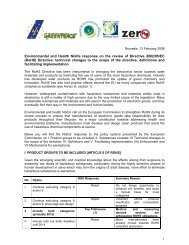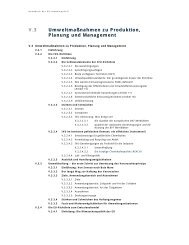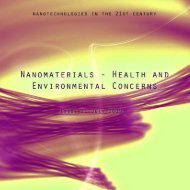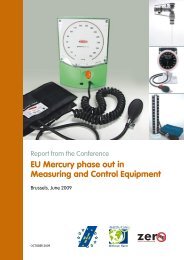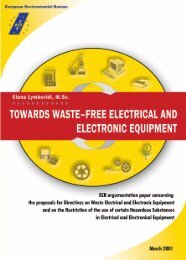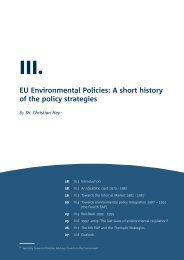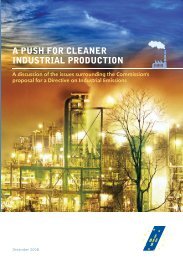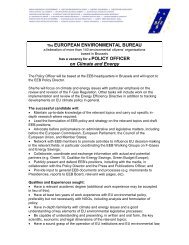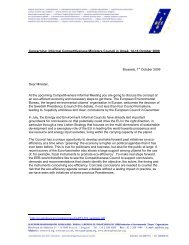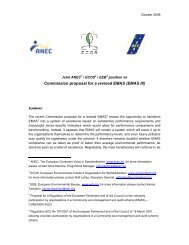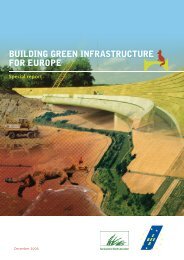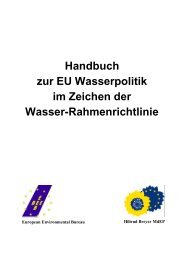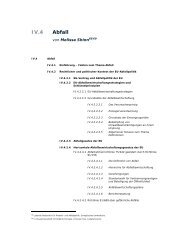Memorandum to Czech Presidency and Ten Test - EEB
Memorandum to Czech Presidency and Ten Test - EEB
Memorandum to Czech Presidency and Ten Test - EEB
- No tags were found...
Create successful ePaper yourself
Turn your PDF publications into a flip-book with our unique Google optimized e-Paper software.
<strong>EEB</strong> <strong>Memor<strong>and</strong>um</strong> <strong>to</strong> the <strong>Czech</strong> EU <strong>Presidency</strong>quantity of produce yielded from them. It should be common sense thatcontrolling the contamination at the source will incur - by magnitudes - muchlower costs than controlling the vast <strong>and</strong> diverse amounts of products instead,especially considering commercial seeds are already a highly controlled product<strong>and</strong> seed producers will have <strong>to</strong> test for the presence of GM traces anyway.Thus, even if seed costs were doubled, their share would be minimal compared<strong>to</strong> the overall costs of the final product.Moreover, by undermining the market of non-GM products, the geneticcontamination of conventional <strong>and</strong> organic products will destroy businesses <strong>and</strong>threaten jobs in the agri-food sec<strong>to</strong>r, which in the past has already suffered <strong>to</strong>omuch from food sc<strong>and</strong>als <strong>to</strong> risk again going against consumer trust. From astrictly economic perspective, it appears that costs <strong>and</strong> risks of GM productionare arbitrarily shifted <strong>to</strong> farmers, food processors <strong>and</strong> retailers <strong>to</strong> the benefit ofthe seed industry.Therefore <strong>EEB</strong> calls upon the <strong>Presidency</strong> <strong>to</strong> work for strict purity st<strong>and</strong>ardsfor GM contamination of seeds, legally <strong>and</strong> technically established at thereliable detection limit of 0.1% as the European Parliament, in its owninitiativereport on co-existence, has also proposed.7.12. S<strong>to</strong>ckholm Convention On PopsPersistent Organic Pollutants (POPs) have been called the “worst of the worst”environmental contaminants. PCBs, dioxins (as a synonym for polychlorinateddibenzo-p-dioxins <strong>and</strong> dibenzofurans, PCDD/Fs), DDT <strong>and</strong> eight other chemicalsare identified for action under the global S<strong>to</strong>ckholm Convention on POPs, whichentered in<strong>to</strong> force in 2004.The Convention is designed <strong>to</strong> add other chemicals that are persistent, bioaccumulative <strong>and</strong> <strong>to</strong>xic <strong>and</strong> calls on countries <strong>to</strong> adopt a precautionary approach.While the S<strong>to</strong>ckholm Convention targets a relatively small number of chemicals -known as the "dirty dozens"- it has the potential <strong>to</strong> influence over 158 countries<strong>and</strong> the European Union, which are parties <strong>to</strong> the treaty.POPs are a priority for Europe <strong>and</strong> for <strong>EEB</strong>. They are a central focus of REACHlegislation <strong>and</strong> many POP chemicals are also subject <strong>to</strong> the IPPC <strong>and</strong> otherdirectives tackling pollutants of air, water <strong>and</strong> waste. Many pesticides <strong>and</strong> someof the RoHS substances are also POPs.Even with these European efforts, global action is necessary <strong>to</strong> protect the planetfrom POPs. The process for adding “new POPs” <strong>to</strong> be prevented is at the hear<strong>to</strong>f the S<strong>to</strong>ckholm Convention. Seven of the twelve chemicals under review wereproposed by European countries or the EU. There has been strong resistance39



